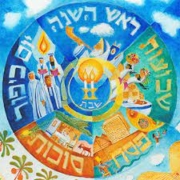Graceful Optimism / Graceful Masculinity – Ki Tisa
 Part of a periodic Torah series on graceful masculinity and Jewish values.
Part of a periodic Torah series on graceful masculinity and Jewish values.
וַיִּשְׁמַע הָעָם, אֶת–הַדָּבָר הָרָע הַזֶּה—וַיִּתְאַבָּלוּ; וְלֹא–שָׁתוּ אִישׁ עֶדְיוֹ, עָלָיו.
The people heard this bad tiding and they mourned; and they, each man, did not put on his crown. (Exodus 33:4(
When G-d created this world, it was filled with hope, possibilities, and aspirations. On the sixth day of creation G-d said (Genesis 1:31) וַיַּ֤רְא אֱלֹהִים֙ אֶת־כָּל־אֲשֶׁ֣ר עָשָׂ֔ה וְהִנֵּה־ט֖וֹב מְאֹ֑ד וַֽיְהִי־עֶ֥רֶב וַֽיְהִי־בֹ֖קֶר י֥וֹם הַשִּׁשִּֽׁי׃ “And God saw all that G-d had made, and found it very good. And there was evening and there was morning, the sixth day.” At that moment, according to the midrash, G-d declared “I wish that there would always be as much grace before me as there is now.” The grace that G-d is referring to here is the grace that is found when the desire for evil (Tov Meod) is converted to good and then becomes “very good.”
This was ultimately achieved at Mount Sinai with the giving of the Torah. Even the angel of death was banished (Eruvin 54a) on the sixth day of Sivan. This moment was so essential to the purpose of this world that the Rabbis (Shabbos 88a) read “The six day,” in Genesis, as the acceptance of the Torah by Israel on the sixth day of Sivan as a condition for the world’s continued existence.
The Talmud explains that when we said “We will do and we will listen”, angels descended and wove two crowns upon our heads. Tragically this was undone with the sin of the golden calf, which the people requested when it appeared to them that Moshe was delayed in returning from the mountain (Exodus 32:1). The word for delayed בֹשֵׁ֥שׁ is understood (Shabbos 89a) as “with the sixth” hour of the day and it was at that moment that we lost our crowns.
Recanti (Vayeitzie) explains that חן / chein (grace) is a language of “crown”, as in Proverbs 1:9 when the traditions of parents are described as: “They are a graceful crown upon your head.” It is not coincidental that we find the word “grace” six times in this parsha as the remedy for our miscalculation.
G-d wanted to create this world exclusively through the strict attribute of judgment but saw that the world created in such a way wouldn’t last, so G-d made a partnership with mercy. The purpose of mercy, in this arrangement, is to create a path back to the ideal space, free from negative judgment. Ups and downs are certainly part of life, and the true test of our faith is what we do when we find ourselves in the lower spots.
Rashi explains that after the sin of the golden calf, they mourned the loss of their crowns. R’ Moses Feinstein (Drash Moshe) understands their grief coming from a mistaken sense of hopelessness. They felt that their distance from G-d was permanent and they would never be able to restore their former glory of closeness. The Shach explains (33:7) “Moshe took” as meaning that he returned the crowns to them on erev shabbos.
We are not static, which means we have the capacity to change for good. King David wrote (Psalms 24:3) “Who may ascend the mountain of the L-rd? Who may stand in G-d’s holy place?” Coming down from a mountain doesn’t mean we can’t still stand in a holy place.
The numerical value of the word חן / chein (grace) is 58. The six times that “חן” appears in this week’s Torah reading add up to 348, the value of the word שמח, happy. Making amends for our mistakes is a mitzvah, and we are meant to serve G-d with joy. Our ability to correct the missteps of the past, and our faith in G-d’s desire for us to be imbued with grace, is a source of light and gladness even in dark and troubled times.

By R. Mike Moskowitz.









